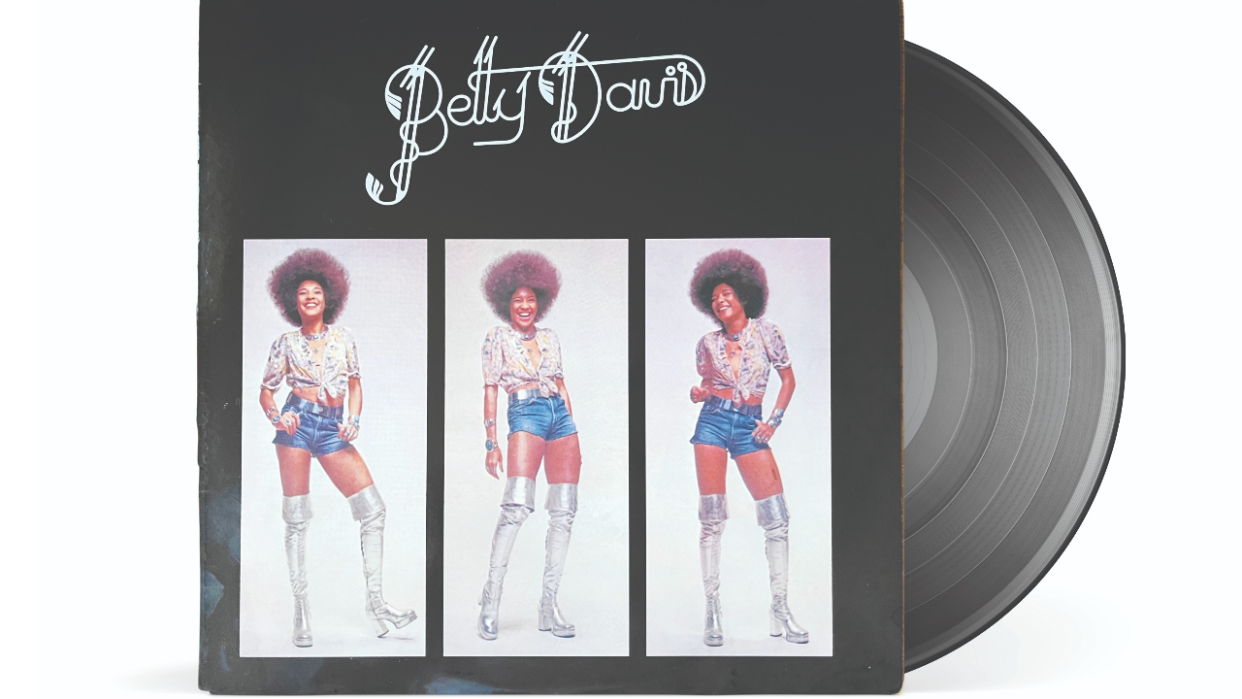Betty Davis's self-titled debut album is essential funk guitar listening

- Oops!Something went wrong.Please try again later.
My friend Andy Hess and I were reminiscing about how amazing the Bay Area music scene was in the ’70s and early ’80s. There was Tower of Power, Malo, Santana with Neal Schon, Larry Graham, Sly Stone, Merle Saunders, the Pointer Sisters, Pete Escovedo at Cesar’s Latin Palace, Sylvester, and Journey before Steve Perry.
The club Larry Blake’s had a great blues scene, as did the South Bay over at the Saddle Rack, while the Oakland music community was vibrant and diverse with artists who pushed the musical envelope while performing some of the best funk ever played by human hands.
Among the many performers in that scene was Betty Davis. The second wife of Miles Davis, Betty was about two years divorced from the trumpeter when she cut this self-titled album in 1973 for the Just Sunshine label.
The record wasn’t a big hit, but reissues by Light In the Attic have helped to bring Betty some of the attention she so richly deserves, while they give us a chance to hear the early work of great East Bay players of that era who appear on this debut, including Neal Schon and Larry Graham.
Betty is less a singer and more a messenger, taunting the listener as she oozes sexuality from one track to the next.
We meet her on side one’s opener, If I’m in Luck, I Might Get Picked Up, where the band plays a fantastic monolithic funk-rock groove. Betty leaps out of the speakers, an unapologetic badass singing, “So all you lady haters, don’t be cruel to me / I said I’m vampin’, trampin’, you can call it what you wanna.”
Neal Schon kicks off Walking Up the Road with a great funky intro as the drums establish the downbeat on this hypnotic riff, over which Betty sings, “I’m walkin’ up the road / I’m gonna uplift your soul.”
Anti-Love Song has the extraordinary Larry Graham grooving and basically inventing slap bass, while Schon’s wah lines complement the lyrics. Betty’s performance is understated and personal as she whisper-sings, “I know you could have me shaking / I know you could have me climbing the walls / That’s why I don’t wanna love you…”
The funk boogaloo Your Man, My Man closes side one, with Betty telling off another woman with whom she shares a two-timing lover. Betty Davis was really something!
Side two gets off to a fast and rocking start with Ooh Yea. Betty sings her sexually impressionistic lyrics – “Do you want it? (Ooh, yeah, yeah) / Do you need it? (Oh, yeah, yeah, yeah)” – with such honesty that the content never feels manipulative. It’s just Betty being herself.
A good example of her empowerment is on my personal favorite, Step-in In Her I. Miller Shoes. “She could’ve been anything that she wanted / She had bells from her head down to her toes,” Betty sings. “Instead she choose to be nothing!”
Betty’s message has empathy, a warning and a subtext that this isn’t going to be her fate. It’s followed by Game Is My Middle Name, a great riff rock/funk tune on which Betty plays the submissive predator.
The album closes with In the Meantime, a stylistic departure on which she delivers a hint of Sam Cooke and the Impressions, Betty Davis style: “I don’t have no one that I can make love to / I don’t have no one to satisfy me / But in the meantime I’ll make do what I have.” Although the written lyric might reflect otherwise, I hear this as a song of inspiration and hope. Betty is celebrating being alive.
Betty Davis is a great record from an era of equality, feminism, sexuality and accepting who you are. Those times weren’t perfect, but when I listen to Betty Davis, I feel what freedom really is: the right to be who you are, not who you’re told to be.
Look for the release of Jim Campilongo 4TET’s new album, She Loved the Coney Island Freak Show, in July 2024.

